The 3 Types of Real Estate Websites for Agents
So you’ve decided to start a real estate website!
Before you start looking for website providers, you need to know what you’re looking for.
Why are you starting a website?
The answer will guide what you need in a site.
I think there are 3 types of real estate websites.
- Lead Generation Site
- Brand Site
- Content Site
Below are some examples of some of the traits of these different sites.

But wait! Every real estate site is a lead generation site!
That’s sorta true. But as you’ll see, there are different ways that your website can contribute to your business depending on your lead generation model.
Understanding the kind of site you need is the first step to understanding which provider you should use and how to use your website effectively in your business.
Lead Generation Site
Goal
To get visitors to submit their contact information.
Lead generation sites are essentially landing pages, often the destination from paid advertising, designed to get customers to submit their contact information. They also usually have very good home search features to keep buyers on the site.
Features
- Forced Registration. When you’re spending money on leads, you can’t afford any to slip through the cracks. All the major lead generation sites have forced registration before viewing homes for sale, often as aggressive as the first or second home viewed. This ensures you capture the email and name, enough information for your (hopefully) solid funnel to start that lead on the path from prospect to client.
- Brand Neutral. It’s not uncommon for lead generation sites to de-emphasize the broker or agent brand, beyond meeting state requirements for identifying the brokerage and agent. Consumers at this point in the funnel often don’t feel ready for an agent and don’t want to feel sold to. They are often more comfortable on a site that doesn’t have an agent’s face staring at them. They’re often also given generic URLs like “Search[Your City]Homes.com” instead of the agent’s or broker’s brand name.
- Minimalist. Content sites encourage exploration and learning, and include numerous internal links, full menus, and even outbound links! Lead generation sites don’t want customers getting distracted from what they are there to do: submit their information in exchange for a home valuation or access to view homes on the IDX. Generally, they will keep things simple to avoid distractions.
- IDX. The IDX is key to a lead generation site. Access to homes for sale is the lead magnet that gets folks to sign up! I have no idea why consumers still submit their information to view homes when those homes are often available without requiring an email on the portals like Zillow, but they do!
- Not Customized. Many lead generation sites look a lot alike. And that is okay, because the idea is conversion and a seamless buyer search experience. Many have limited options to customize the site look, feel, and flow because they don’t want agents interfering with their carefully calibrated optimization for converting.
- Content Optional. These sites often have a “blog”, but featuring brief, often generic content that is posted regularly enough to make the site look “alive”. It is not content that is going to rank on Google and is not meant to. The goal is to get people to submit their information and give buyers and sellers the tools they need to stay off Zillow.
Examples
The Jim Allen Group
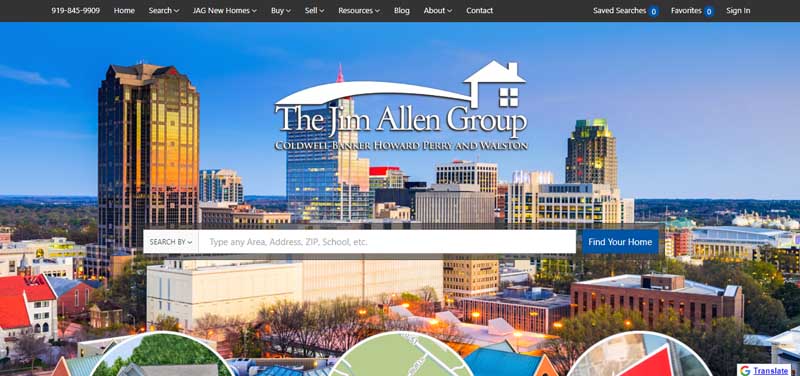
Jim Allen has a BoomTown website. This site breaks some of the above “rules” in that it has a very full menu with lots of links inviting exploration. BoomTowns primary purpose, however, isn’t far away. You can see the “Saved Searches” and “Favorites” section prominently, reminding would-be home shoppers that they have everything they need here to conduct and manage their home search.
Gentile Team
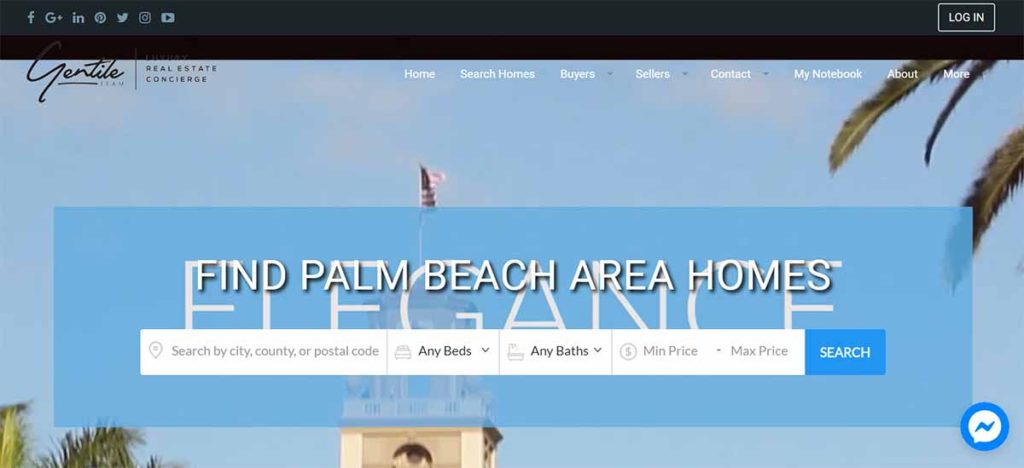
This CINC site includes the CINC “Notebook” for buyers to notate their home journey, another example of how this site is geared toward providing a home for leads sent here. The homepage includes quick links to searches, a “What’s my home worth?” call-to-action, and limited menu choices to keep your prospects focused.
Lead Generation Site Providers
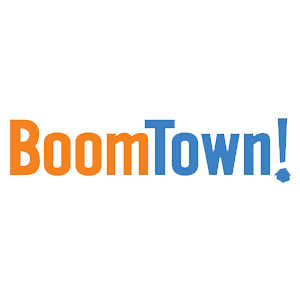
BoomTown
$750+ setup; $1000+/mo. BoomTown is a favorite in the industry, known for its robust paid lead generation. It is one of the more expensive products, designed for top producing teams and brokerages who are ready to work the phone.
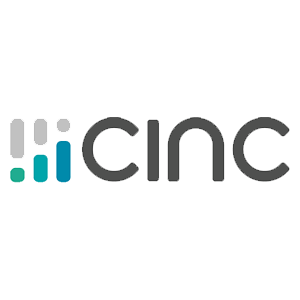
Commissions Inc (CINC)
$1500+/mo. CINC is a full marketing, website, CRM platform that also emphasizes brokerage-wide tools like agent accountability, tracking conversion rates, and reporting. Like BoomTown, it is designed for paying for and converting internet leads.
Brand Site
Goal
To serve as a professional online presence.
The purpose of a brand site is to show up in Google when someone searches your name, make you look professional, and showcase your services.
These can be as simple as a “business card site”, a simple, very cheap site designed to communicate that, yes, you are in business and provide folks a method to contact you.
Or it could be a highly customized site like many of the ones used by luxury agents, real estate celebrities, or agents focused on very niche offerings.
Features
- Personally Branded. Brand sites are usually focused on you. You’re hoping that when buyers Google your name that your site will pop up instead of a broker page, or your Facebook page, or who knows what. For the higher end, brand sites are often focused on the personal brand of celebrity agents and influencers. Their USP is their personal brand, not blogs or IDS home searches.
- No Forced Registration. If you even have IDX, you’re not likely to force folks to sign up. Your site is all about you and your services, and you don’t want to annoy people by asking them to sign up. That isn’t your main business.
- Customized. Developing a unique brand is diluted some when your site looks exactly like your competitor who is using the same website provider. Brand website providers usually have a variety of
- IDX Optional. What? No IDX? Heresy! But the reality is that you can pull off a brand site without IDX. Lots of consumers are content using sites like Zillow for their home search. While there are advantages to having consumers on your own platform, it isn’t necessary to be a successful agent. A brand site is just about you and your services, and doesn’t have to be “functional” as a home search engine. That said, most “brand” sites do have IDX, as it is a staple of real estate websites.
- Niche–Friendly. When you or your particular service is the main selling point of your business, it makes sense to put that service first and foremost. For example, if you specialize in niches like probates, historical districts, or ADA accessible dwellings, then you’ll want to lead with that service and not necessarily the typical “What’s Your Home Worth” content.
Examples
John Kirkpatrick
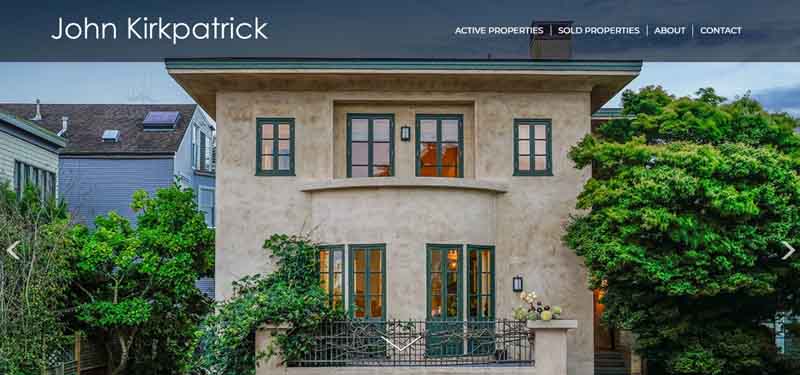
John Kirkpatrick owns this Agent Image website with no IDX! It features his own active listings, his past sold listings, and that’s it!
Instead, it’s just a good looking site, branded to him, prominently featuring him and his services. There is no clutter in the menu and it’s simple. It’s easy to contact him. You don’t have to have a property search as an agent.
The Narety Group
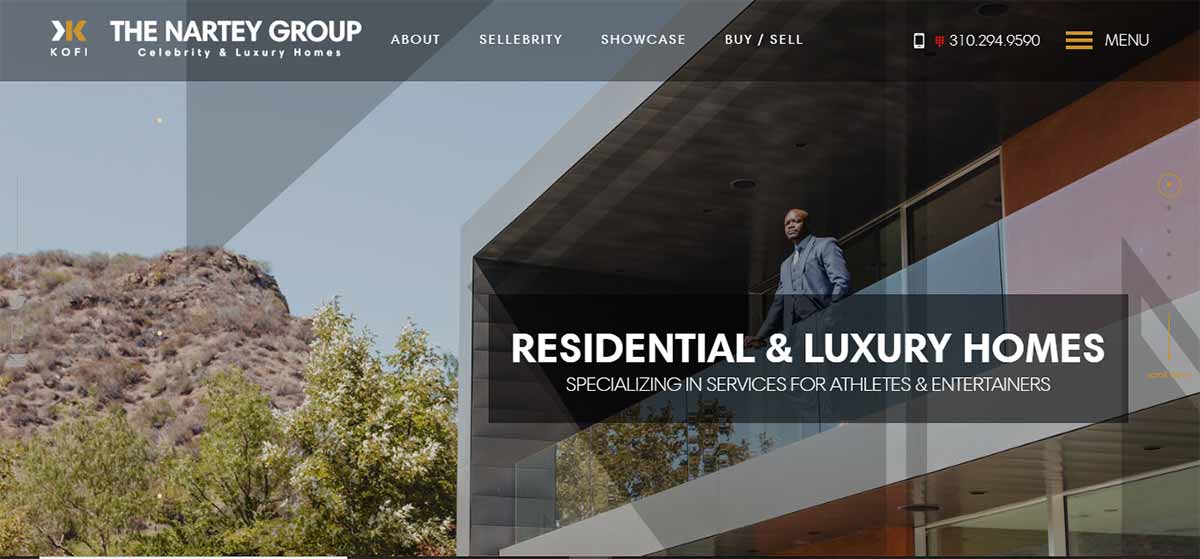
The Narety Group is another Agent Image site without IDX that is very well designed and modern, with large, flat home sections and simple menus. They focus not on the property search but on their services, which are specifically targeted toward professional athletes.
Brand sites are often well suited to niches like these, where clients are looking not for the generic Zillow-like home shopping experience but instead have bespoke needs for which a niche product offering is best suited.
Brand Site Providers

Agent Image
$90+/mo, $2000+ setup. Agent Image builds real estate sites on WordPress, and has a wide selection of websites ranging from a basic template to high-quality custom options. They can be among the pricier to get started, but give you the benefit of owning your own site plus a great, customized look ideal for brand sites and luxury agents.

Placester
$79+/mo. Placester is an affordable website option that can provide your own site and a professional online presence. They have a varied selection of sites and options and can be a great fit for an agent looking for a simple start to their web presence.
Content Sites
Goal
To attract business and customer loyalty organically with quality content.
Content is a much bigger investment than either lead generation sites or brand sites, and can take years before it is firing on all cylinders. It may mean blog posts, YouTube channels, area guides, and more “freebies” that can rank on Google, shared on social media, and build brand loyalty and trust months and years before the deal is done.
Features
- No Forced Registration. Content sites want visitors to explore, even if it means many escape without submitting contact info. Content sites trust that those folks can be lured back in the future with retargeting or other organic content pieces. Lead generation sites, by contrast, usually only have one shot to get contact information before the prospect disappears for good.
- Branded. You are giving free value with a content site, and need to reinforce your brand so that consumers associate that value with your brand. Unlike brand sites, content sites aren’t as likely to be personally branded (though they still may be).
- Content Rich for SEO. These are 500 word generic blog posts like those you’ll find on the other site types. Quality, 1000+ word long-form blogs, in-depth and colorful guides, or well-produced videos are staples of a content site. You may just do one of these methods. But whatever it is, you put time into it and it’s the best quality in your market.
- IDX Optional. I personally think a content site is best with an IDX and home search. Most certainly have both. But there are examples of several that do not, and instead are sites that are essentially publishers. They create content, and often then will link to an agent’s lead generation or brand site where there is an IDX for buyer home search.
- Ownership. It can be especially important to “own” your content site. Unlike the other options, your content website is itself an asset. Organic Google or YouTube visitors are worth money. That is how Zillow is a billion-dollar business, after all! Some real estate sites even earn money from paid advertising and are mini-publishing companies with another income stream for your business. You don’t want to build that on a system (or, worse, domain name) that someone else owns.
Examples
Denver Ear
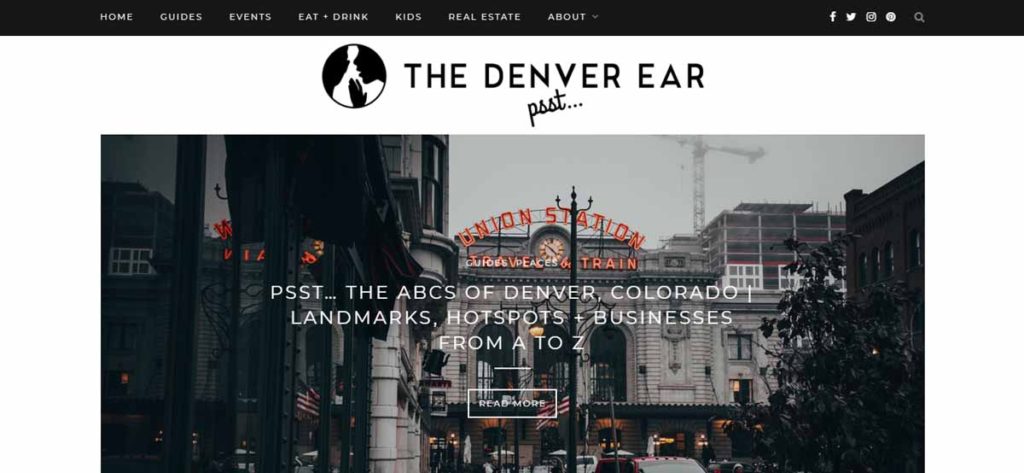
The Denver Ear, from Mor Zucker, is an example of a content site that doesn’t even have any real estate listings or real estate focused content. Instead, it’s all about the Denver area and boasts an estimated 50,000 monthly organic visitors on Google.
Ruby Home
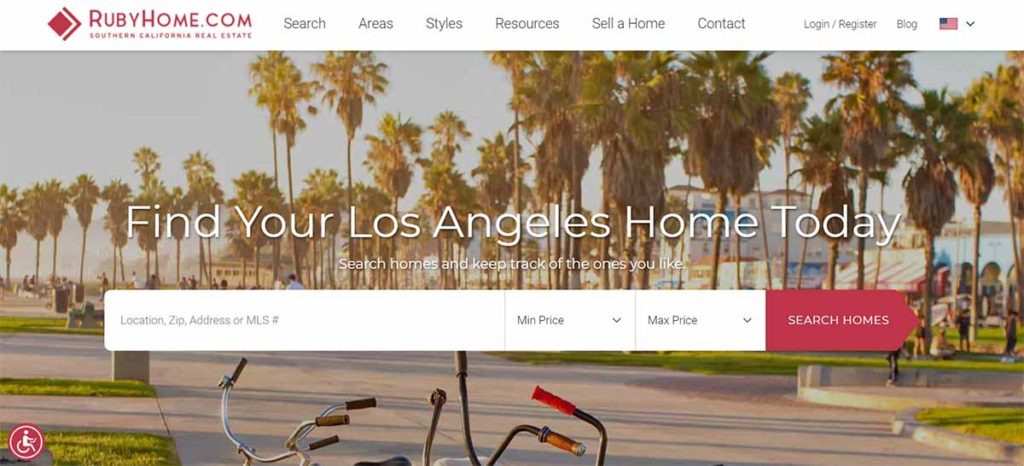
RubyHome.com is the content site for Tony Mariotti, a Los Angeles agent who got his start in the tech world. Tony owns two other sites at Luxury Homes Los Angeles and Great Vancouver Homes, both of which also get 5 digits worth of organic monthly traffic. He is a team with another agent in Vancouver. Tony does the website and marketing, the other agent shows and sells homes!
Content Site Providers
Below are some of the website providers who specialize in the kinds of features a content site would most prize.

Real Estate Webmasters
$500+/mo. A Canadian company and the premium real estate website service in the space. Real Estate Webmasters is not cheap. But they also deliver, with their websites reliably outranking the competition on Google with the best SEO game by far.
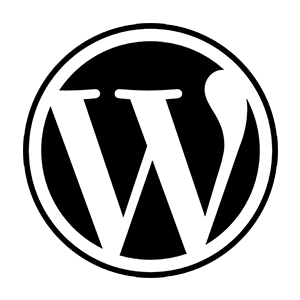
WordPress
~100+/mo. For the ultimate DIYer! WordPress powers approximately 30% of the world’s websites, not just blogs, and can be as cheap or powerful as you want make it. You can do it yourself, or hire a developer/design team to build a website for you. It is highly customizable, and there are petabytes of WordPress resources on the Internet to help you craft exactly what you want from your site. It is a great option for anyone who enjoys dabbling in their website and wants a solution that can scale with their business.
Conclusion
“I need a website!”
Okay. Why? What kind? These are important questions in your search for the hub of your new online presence. Give some thought to your business model and choose the right website and online strategy for your real estate business!


